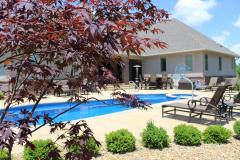Common Types of Inground Pools in Sevierville

Pools
are no longer a luxury for many households across the US. Besides increased
income, the technology involved in making pools has undergone great development
in the past few years such that the amenity is less costly. Interestingly,
households have various designs and types of pools from which they can choose
depending on the cost of installation.
Pools
are installed either above the ground or inground. However, inground pools are
more convenient. The developed technology has enabled developers to use
different materials and designs to create different types of inground pools.
For example, inground pools in
Sevierville make use of fiberglass to ensure that the amenity is
safe, secure and long-lasting. Here are the types of inground pools.
1.
Fiberglass pools
Simplicity
and the need to cut costs is the major driver of the increasing use of
fiberglass to make inground pools. Indeed, the fiberglass pool comes
ready-made. The manufacturer has a range of designs in place for you to choose
from but you can also make a special request for a custom design.
Interestingly, this type of pool comes with everything premade. This includes
spas, steps, and benches. Therefore, all that you need to do is to sink a hole
and install the fiberglass structure.
As
such, the process of building fiberglass inground pools is easy and quick.
Additionally, the nature of the material makes it impossible for algae to
colonize your pool. However, this material is expensive and has a lifespan of
between 10 to 15 years.
2.
Aggregate
finishes/regular pools/concrete with plaster
This
is the oldest type of inground pool. Here, the building material that goes into
the making process includes plaster, concrete, and shell. These materials
became popular for making residential pools because they are cheap and they
last longer. Unlike fiberglass, which is ready-made, this type of pool involves
a lot of work and labor. However, this kind of pool is increasingly becoming
extinct as more people move to fiberglass materials and other
alternatives.
3.
Vinyl pools
Vinyl
is the most popular alternative to fiberglass. Unlike fiberglass, vinyl pools
do not come premade, at least not fully. Instead, most of the material is put
in place at the location. Further, this type of pool requires a lot more work
compared to fiberglass pools but less than the concrete and plaster pools. Once
the hole is ready, prefabricated structures are used to support the walls. Then
vinyl liners go at the bottom thus holding water in place. Similar to
fiberglass, vinyl deteriorates faster than concrete and such a pool might not
last beyond 18 years.
Post Your Ad Here
Comments